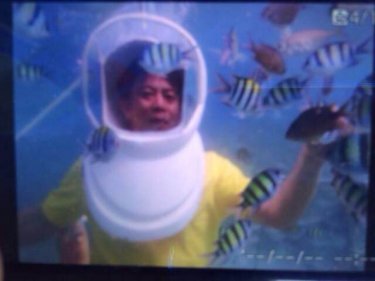Phuket Tourism and Sport department director, Santi Pawai, tested seawalking for himself earlier this week and also tried parasailing and diving.
''There have been complaints and concerns about safety and other issues so I needed to see these things for myself,'' he said.
Perhaps the most contentious of the activities is the ''seawalkers,'' where customers don helmets and descend to the sea bottom. In some places, activists grew concerned because coral reefs were damaged to clear space on the sandy bottom for the walkers.
Khun Santi went down with one of two seawalking firms still operating on Hei Island, off Phuket.
He said six or seve customers were supervised at a depth of five metres by about two staff per person, ensuring safety and taking photographs.
The walkers follow metal railings set into the bottom.
Fish are attracted by bread fed to them by the staff. But an official at the Phuket Marine Biological Centre told Khun Santi that bread should not be fed to the fish.
''It's not a natural food so it changes the habits of the fish and probably causes them health problems,'' the PMBC officer told Khun Santi.
Khun Santi also tried parasailing and diving but did not find either activity to be dangerous.
The biggest problem with parasailing on Phuket's beaches lies with the dangers the speedboats pose to swimmers in the water, and the risk of people on the beaches being hit on takeoffs or setdowns, especially at Patong.


.JPG)
.JPG)
.JPG)
.JPG)
.JPG)



Since Khun Santi sees no danger in parasailing and diving then he was clearly the wrong person to do the inspection and it beggars belief that he did not investigate the safety of the jet skis
Posted by Paul on January 15, 2015 11:04